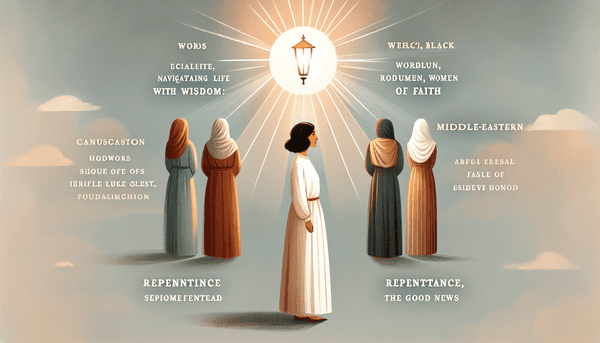The Parable of the Talents: A Call to Action
In the Gospel according to Matthew (Matthew 25:14-30), Jesus shares the Parable of the Talents, where servants are entrusted with their master's wealth according to their abilities. This parable casts a spotlight on the imperative to use our God-given abilities to their fullest potential. It's a divine call to action, urging us to be proactive, seek growth, and be accountable for our entrusted talents. Proverbs 16:3 encourages us to commit our work to the Lord, and our plans will be established, while Ecclesiastes 9:10 exhorts us to do whatever our hands find to do with all our might. However, the parable also warns us of the severe consequences of inaction, driven by fear or laziness, which can lead to missed opportunities and even the loss of what we have. It is a sobering reminder of the spiritual implications of our choices and the joy that comes from serving and contributing to God's kingdom. 'Well done, good and faithful servant,' the master says to those who have been diligent, encapsulating the ultimate reward for faithfulness in stewardship.
David: A Heart Aligned with God
David's designation as 'a man after God's own heart' in 1 Samuel 13:14 and reaffirmed in Acts 13:22, stands as a testament to his sincere and committed relationship with God. Despite his flaws and sins, David's life exemplifies a heartfelt repentance and faith that endeared him to God. This relationship was marked by a desire to seek and do God's will, humility in acknowledging his faults, and a spirit of worship and repentance, as exemplified in the penitential Psalm 51. For us, David's life serves as an inspiring blueprint for how we can cultivate our own relationships with God, pursue obedience and faithfulness, and learn from his example to offer praise and repentance in our spiritual journey. A heart aligned with God is not characterized by perfection but by a steadfast love and devotion to following His will.
Taking Risks with Faith
The Bible repeatedly encourages us to approach life with a spirit of power, love, and self-control, as noted in 2 Timothy 1:7. Taking risks with faith requires us to overcome fear with God's strength, act with love and discipline, and trust in the transformative power of faith in action. Trusting in God's guidance (Proverbs 16:3) means acknowledging His sovereignty over our understanding (Proverbs 3:5), and having the assurance that He is with us as we step out of our comfort zones. The initiative is a powerful force; knocking on doors and seizing opportunities (Matthew 7:7-8) calls for both prayer and action in pursuing God's will. As believers, we are encouraged to start conversations and engage with the Word, understanding that faith without works is dead.
Conclusion
Throughout this exploration of biblical wisdom, we are reminded of the enduring relevance and power of Scripture in offering guidance for contemporary challenges. The Parable of the Talents and the life of David provide valuable insights into using our gifts, embracing faith over fear, and the transformative effect of patience. These stories from the Bible encourage us to integrate spiritual principles into our daily lives, seeking to grow closer to God and to live out His will with passion and perseverance. As we reflect on these teachings, let us be inspired to delve deeper into our understanding of Scripture and its application to our personal and collective journeys. For those looking to strengthen their Bible reading practice amidst the cacophony of daily life, this article offers practical advice on finding solace through Scripture.
FAQ
Q: What is the main message of the Parable of the Talents?
A: The Parable of the Talents teaches us to diligently use the gifts, talents, and opportunities God gives us for His glory and the advancement of His kingdom, and highlights the consequences of neglecting or wasting these gifts due to fear or laziness.
Q: How is David described as a man after God's own heart?
A: David is described as a man after God's own heart because he had a deep, sincere, and committed relationship with God. Despite his significant flaws and serious sins, David was repentant and sought to do God's will.
Q: How does taking risks relate to faith?
A: Taking risks with faith involves stepping out in trust and confidence in God's strength and guidance, overcoming fear and embracing the opportunities God provides to use our talents and abilities for His purposes.
Q: Why is patience important in both personal and financial matters according to the Bible?
A: Patience is a fruit of the Spirit that plays a crucial role in spiritual growth, character development, and wise decision-making. In financial matters, patience leads to prudence, long-term planning, and faithful stewardship.






